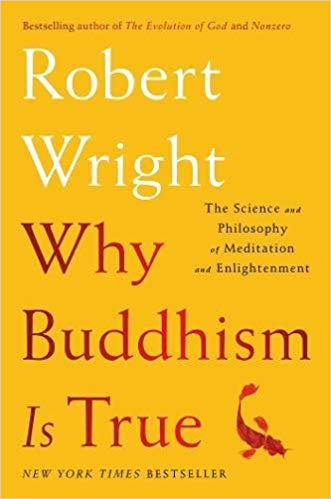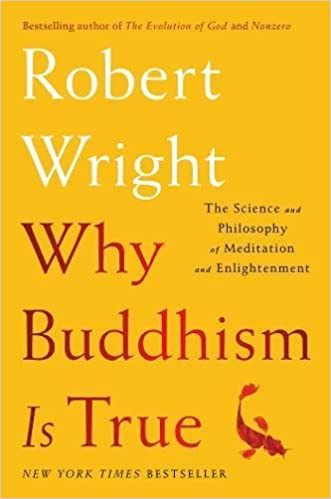Robert Wright – Why Buddhism is True Audiobook
Robert Wright -Why Buddhism is True Audiobook

Why Buddhism is True Audiobook
As Wright sees it, ‘The Reality’ of the human condition is to be found in natural choice, as explained through transformative psychology in his really early book The Ethical Animal: Why We Are, the Method We Are: The New Science of Evolutionary Psychology. And he recommends that this truth is distinctly resolved by ‘The Way’ of Buddhism, or at least naturalisticBuddhism This ‘nonreligious Buddhism’ is Buddhism without reincarnation, spirits or gods. Why Buddhism is True Audiobook Free. Likewise the concept of complete or long-term knowledge is held at arms size.
Nonreligious, naturalistic Buddhism rests on a couple of vital ideas: the concept that people do not have an essential ‘self’ (no- self), the principle that dissatisfaction (dukkha) is brought on by the ‘hedonic treadmill’ of search of satisfaction and likewise avoidance of pain, which reflection can assist us to leave this treadmill. The thoughtful method is comparable to that of Stephen Batchelor in Admission of a Buddhist Atheist in addition to Nonreligious Buddhism: Envisioning the Dharma in an Uncertain World.
There is a clearly Gnostic bent to the making up right here, right from the start, when the movie The Matrix is explained. Right here natural choice is the procedure which holds us in a state of deceptiveness, deforms our understandings of truth, prevents us from experiencing long-term fulfillment and likewise fulfillment, and likewise keeps us caught on the hedonic treadmill. And nonreligious-Buddhism is The Way (the ‘red tablet’) that will free us from this unrestricted drama of deception and frustration. This sight of development stands in considerable contrast keeping that of Wright’s previous publication, The Development of God (Back Bay Visitors’ Select), in which natural in addition to social development are rather ‘divine’ procedures through which the Outstanding becomes manifest worldwide. (The God- as- Development sight is furthermore that of the ‘Essential’ spirituality of Ken Wilber, Steve McIntosh, and likewise others.).
Part of this book is devoted to exposing that the crucial concepts of nonreligious-Buddhism are clinically true, through discussion of looks into in psychology and neuroscience (a method revealed to Getting up: An Introduction to Spirituality Without Religious Beliefs, by Sam Harris). This would definitely be additional encouraging if the looks into were explained as a method of examining Buddhism versus completing ideas of health, such as modern-day favorable psychology, yet the book usually avoids this kind of direct contrast. This is reflective of the essential approach of nonreligious-Buddhism: the ideas which do not find support in scientific research studies, such as reincarnation, or lasting knowledge, are deserted or reduced. Nonreligious-Buddhism is reformulating Buddhism to be more routine with modern-day psychology, a vibrant which makes complex the concern of whether clinical research study can be made use of to reveal that ‘Buddhism is true’.
Wright increases on the concept of ‘no- self’ by using a ‘modular’ style of the mind. The principle is that our mind is made up of elements with various goals, requirements, in addition to believed patterns. The elements rush and handle each other on the subconscious level. Simply when amongst them brings an adequately strong sensation, do we then end up being mindful of its involved concept on a mindful level. While Wright finds some support for this modular design from the Insight Meditation college, and likewise from psychological research study, he produces it through his own advised perspective of transformative psychology (Darwinian rivals within the subconscious mind). Remarkably, the variation is reached recommend how mindfulness can enhance our ‘self’- control, in addition to to damage the pull of indulgent or addictive practices.
Among the satisfaction of The Development of God was its in- depth historic circumstances of the approaches which the ‘spiritual market’ of completing ideas, and likewise the requirements of sellers, kings, and likewise leaders all impacted the development of old Judaism, Christianity, in addition to Islam. Wright may have likewise taken this approach with Buddhism, checking out how its history as the state religious beliefs of numerous worlds has really formed its development in time in addition to location. I was anticipating this, and am disappointed not to find it here. Nonetheless, Wright rather looks after to handle some rather subtle philosophical concerns, such as the difference in between the Buddhist concept of ’em ptiness’ (sunyata) and Hindu non- dualism, in such a way that is uncommonly offered. He liven up the conversation with narrative accounts of previous conversations and conferences.
This publication stays in numerous implies an individual account: Wright has actually found a variation of nonreligious-Buddhism that is True for him in his life, and he is bringing us along through his experience and presumed treatment. Unlike great deals of authors on Eastern spirituality, he is in no chance trying to present himself as informed, or a spiritual instructor or master. He is refreshingly plain– humorously self- effacing, and likewise clear concerning his inspirations for making up. Robert Wright -Why Buddhism is True Audio Book Download Along with he is a clear author– he does not attempt to intimidate us with obtuseness and secret, likewise when dealing with hard ideas. The book is not continuously persuading, nevertheless it is including, friendly, and idea- provoking.
